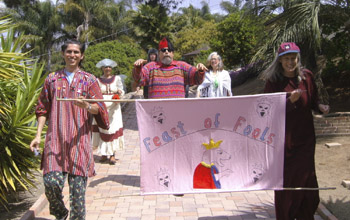The Feast of Fools
by Gene Sager
A group of philosophers and activists, friends, and neighbors has revived an ancient feast dedicated to having fun. And they’re demonstrating the wisdom of balancing world-changing with pure play. Here is inspiration for your Feast.

Photo (c) Gene Sager |
The original Feast of Fools was celebrated in Medieval Europe as comic relief from the restrictions and gravity of contemporary society. The merriment included outrageous games, parades, silly dances and songs, and the lampooning of political and religious officials. The mirthful event was observed around January first and was celebrated annually until the Council of Basil condemned and banned it in 1431.
My family and friends, eight of us, have revived the feast; we have retained the basics of the celebration, but we have dispensed with the lampooning. Lampooning can carry value messages and, for some participants, appear to promote or demote a political or religious cause. Such a message runs counter to the crucial, central theme of the Feast of Fools, which is pure play. Pure play, unlike work and activism, is an end in itself; it is non-instrumental. It enjoys the here and now, neither trying to push nor pull the world this way or that.
We have found that the more foolish the game or activity, the more playful the play. Last year’s feast included balancing a stack of toilet tissue rolls while walking a simple obstacle course (right). By contrast, a well-known game or an activity associated with common social holidays can be humdrum or may even be loaded with distracting memories. Activities like the fool’s parade (see photo) is just foolish enough to help us unload our memories and let go of our inhibitions.
The fools come to our home at about two o’clock in the afternoon, wearing bizarre, creative outfits and, if this year is wacky hat year, a crazy hat. My personal favorite was a homemade hat piled very high with artificial fruit. Somehow, it stayed together and crowned the fool throughout the games. The house is decorated tastefully with socks and shoe strings hanging from streamers. We begin with a champagne (or alternative) toast and “horse divers” – organic vegan finger food. The fool’s parade proceeds slowly around our long loop driveway. It features different drums and instruments every year. I keep time with a saucepan and wooden spoon. Outdoor games follow the parade.
One of the indoor games is the distance candle blow. The fools see how much wind they have. The “easy blow” is ten inches away. Then we try the sixteen inch challenge, and so on. We see how far our “blow out” ability extends. A very different wind activity is each fool’s story of the most foolish thing he or she has ever done. These are humorous, true stories of weakness of mind or weakness of will. After all the outdoor and indoor activities, it is time for an organic vegan feast served on metal pie plates. It can be a potluck, but we have found that it is easy enough if we (the hosts) make a big veggie stew or stir-fry and serve oranges from our trees.
We have hosted the Feast for five years in April; the weather and our fruit and garden veggies are perfect at this time in southern California. The designated wacky apparel and the activities are different every year. All phones and electronic devices are turned off. Since not everyone can be a fool, we invite only those who can. Of course, children are welcome. Most children naturally enjoy pure play. As we say, “Except as ye become like a little child, ye shall not enter the Kingdom of Fools.”
| As Harvey Cox says in the book Feast of Fools, “World changers need not be joyless and ascetic.” |
A word about the competitive spirit. Since the games are quite silly, most people don’t feel competitive. Some years we have awarded points for games and crowned the overall winner as the Monarch of Misrule. But, depending on the personalities, you might want to mitigate the competitive aspect by making wacky changes in the game as it goes along. By the end, no one really knows who is the “victor.” Finally, don’t let the Feast of Fools become a complicated event. The costumes, the decorations, the food, the games…keep them simple and easy.
The original Feast of Fools was banned by Medieval church officials because it was sometimes distorted into drunken revelry and mean-spirited lampooning. We are engaged in undrunken pure play, so we do not expect to be banned by the city or church officials! In fact, our neighbors look forward to the Feast of Fools, and we recommend it to all who dare to be foolish.
We dare to claim we have learned a bit about homo festivus. What is the point of balancing rolls of toilet paper? There is no point. Such activities are “meaningless” in a good sense of the term. For philosophers, we hasten to add that our philosophy is not nihilistic. We do not believe, as the nihilists do, that life has no value or meaning. Many of the fools in our group are committed activists who strive for social justice and a healthy environment. But, as Harvey Cox says in his 1969 book The Feast of Fools, “World changers need not be joyless and ascetic.” Neither is their festivity escapist or obsessive. To balance our world-changing work, we need to enjoy pure fun. If the Feast of Fools has a point or meaning, it is just that: to let go and have fun.
Gene Sager is Professor of Environmental Ethics at Palomar College in San Marcos, California and a frequent contributor to Natural Life Magazine.
|

